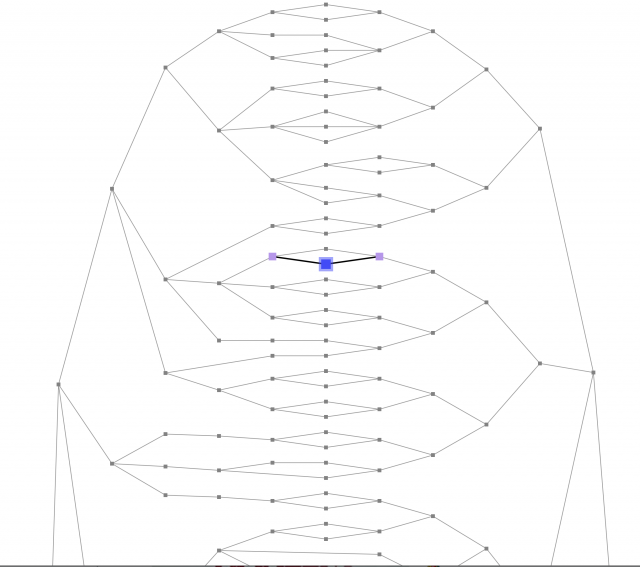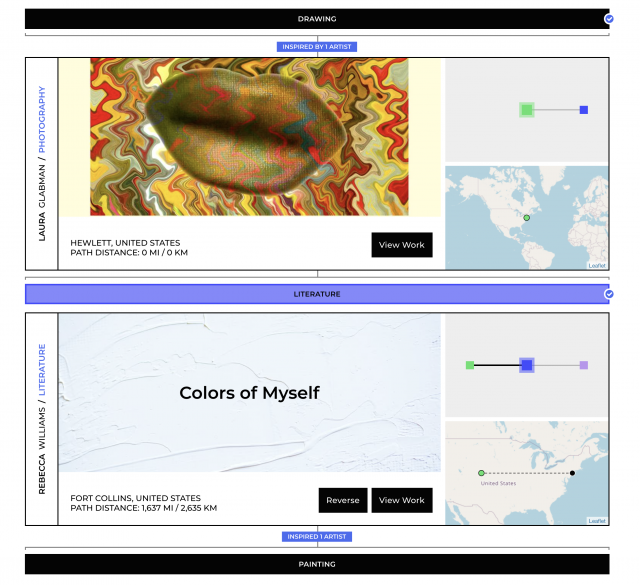
Telephone connects artists from around the world (screenshot by twi-ny/mdr)
TELEPHONE
Opened April 10, free
phonebook.gallery
satellitecollective.org
In April 2015, New York City–based Satellite Collective launched its unique take on the game of Telephone; instead of people forming a line and whispering phrases to one another to see how much the words change, the project connected more than 300 artists from 42 countries, each developing a new piece based on multiple works they were sent, inspired by the sentence “O god, thy sea is so great and my boat is so small.” Five years later, Telephone is back, bringing together 950 artists from 70 countries and 5 continents during a pandemic that has seen arts venues shuttered and travel decreased significantly. Starting on March 23, 2020, a message was given to one artist; the text of that message has not been revealed. It was passed via multiple art forms — painting, photography, music, film, dance, poetry, sculpture, prose — creating a vast network of artists primarily selected by word-of-mouth. An online grid allows viewers to explore one work, complete with image/video, artist bio and statement, and map placing where they are from. You can then follow the branch in one of two directions to see what each piece inspires or navigate the game by artist, discipline, or location.
“It took me a while to let the message reach me. I listened again and again. But I heard an echo, and the work I created is exactly that: a soft, natural response to what was sent my way. I hope it keeps moving and changing,” explains Elizabeth Schmuhl of Detroit, whose watercolor is connected to artists from Helsinki, Los Angeles, and Ulster County. “Translating another’s work is harder than expected, especially from a field different from the one you practice. I translated a written work into an illustrator after a lot of sketching and reading between the lines, and then, when making my own drawing, I had to make sure with myself between time to time that I’m still on the right track and conveying the message I believed I have been given,” writes Keren-or Radiano of Tel-Aviv, whose black-and-white piece links to Lauren Baines of San Jose and Timothy Ralphs of Vancouver, who in turn says about his song, “I have to admit that my own work can sometimes be a bit dark and brooding, but because I wanted to honor the spirit of the works that were forwarded to me, I knew I’d have to (at least temporarily) put that pessimism aside. As I meditated on the works, I began to see them as not only being about inspiration but as being an inspiration in themselves. There was a real sense of delight in creation in those works, and I felt touched by the artists’ generosity of spirit. I only hope I was able to pass on some of that to those that come after me.”

Multidisciplinary artists gain inspiration from participants in online game of Telephone (screenshot by twi-ny/mdr)
Poet Rebecca Williams of Fort Collins describes, “Writing this piece was in some ways challenging. Usually, I don’t write given a prompt. I normally avoid it. Having participated in a similar telephone game recently for which I wrote a song, I was eager to participate in this one of a global scale. I participated because creating in the circumstances which we face (a global pandemic) has been challenging. My band has been forced to a complete standstill and it puts you face-to-face with the question of why you are actually creating in the first place. Of course, in the end, it is the love and passion for creation, and without it, I truly feel empty. I think my apprehension comes from a kind of distaste for mediocrity. Something which I have always battled and struggled with. I was given such a beautiful work of art to be inspired by, and while I looked at it, and studied it, I asked myself what it meant to me, then the words came easily. Perfection doesn’t exist. Mediocrity does, but beautiful things are always a bit imperfect.” And writer, musician, and Torah teacher Alicia Jo Rabins of Portland, Oregon, points out, “All art is translation, transcription, and transmission. It was fun to collaborate with a mysterious fellow translator/transcriber/transmitter — at the risk of sounding totally woo, it made me feel more grounded in the source of the great flowing stream of art and consciousness that happens at all times. It’s easy to feel alone and it was nice to have company. I think I got what the previous artist was trying to convey. I hope I get to meet them someday.”
Conceived, developed, designed, edited, directed, engineered, and curated by Kevin Draper, Katelyn Watkins, Matt Diehl, Ben Sarsgard, Kelly Jones, Ramon M. Rodriguez, Jennifer Spriggs, Sergio Rodriguez, Madeline Hoak, Sean Tomas Redmond, and Nathan Langston, Telephone can occupy you for hours on end, looking at different ekphrastic works or visualizing it as one giant multidisciplinary, collaborative canvas that expresses our never-ending deep desire for creativity, inspiration, and connection, especially in times of isolation and doubt.